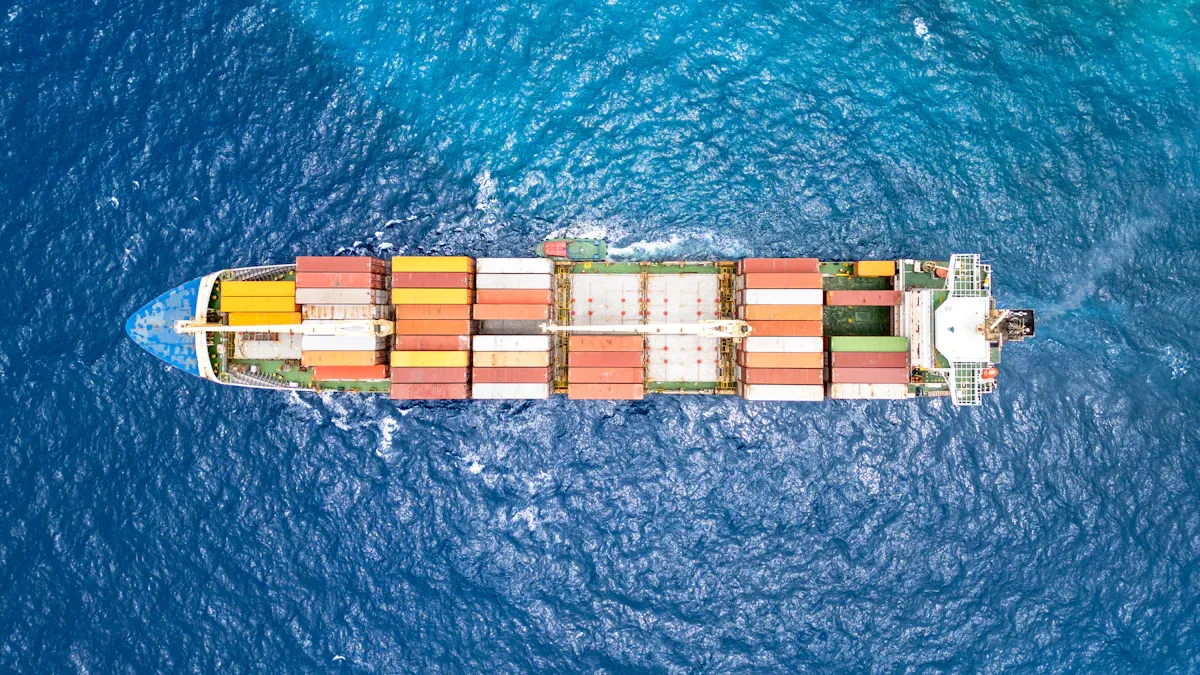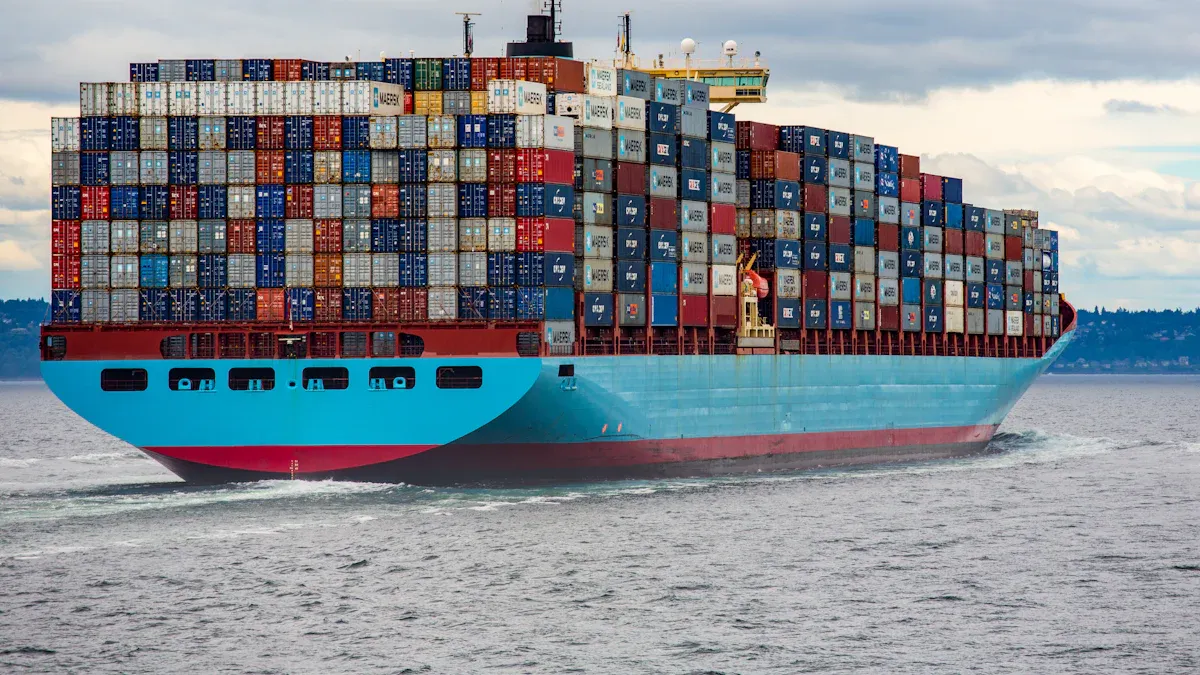
Image Source: unsplash
Foreign Trade Cargo Insurance keeps goods safe during shipping. Many importers and exporters use this insurance to lower risks. They use it when sending or getting cargo from other countries. People want to learn about the types of insurance. They also want to know how to buy the best policy. They need to know what to do if there is a problem. This insurance helps businesses avoid losing a lot of money. It also helps them feel calm when trading with other countries.
Foreign Trade Cargo Insurance Overview
What It Covers
Foreign Trade Cargo Insurance is like a money safety net for goods. It helps when goods travel between countries. This insurance keeps shipments safe from many problems. Shippers and receivers use it to protect their cargo from surprises.
The most common risks covered are:
- Loss or damage from natural perils, like storms or floods
- Fire and explosion
- Theft and piracy
- General average loss, which means all cargo owners share the loss if some cargo is given up to save the ship
- Jettison and washing overboard, when cargo is thrown off or swept away
- Cargo damage from bad handling or stowing
- Collision and sinking
- Contamination and infestation
These risks can hurt any shipment by sea, air, or land. Insurance helps businesses get money back fast. They can keep trading without big problems.
Why It Matters
Foreign Trade Cargo Insurance is important because it helps importers and exporters feel safe. They know their goods are protected from many dangers. This insurance pays for the full value of the shipment. It does not matter what caused the loss or damage. Businesses do not have to show the carrier made a mistake to get paid.
Cargo insurance and cargo liability insurance are not the same:
- Cargo insurance does not need proof that the carrier was at fault. It covers many risks, like natural events and bad handling.
- Cargo liability insurance only pays if the carrier did something wrong. The coverage is smaller and needs proof of fault.
- Cargo insurance protects the goods themselves. Cargo liability insurance is about the carrier’s legal duty.
Tip: Companies should pick cargo insurance for better protection and faster claims. This helps them avoid losing money and keeps their supply chain working well.
Types of Cargo Insurance

Foreign Trade Cargo Insurance has different types. Each type protects goods in its own way. Companies pick the best type for their shipping needs.
All-Risk
All-risk insurance gives the most protection. It covers many reasons for loss or damage. This includes theft, fire, and storms. Many importers and exporters like all-risk insurance. It helps them worry less about their goods.
Named Perils
Named perils insurance only covers listed risks. Common risks are fire, collision, and sinking. If a risk is not listed, it is not covered. This type is good for shipments with less risk or lower value.
General Average
General average is a special shipping rule. If a ship is in danger, the crew may throw some cargo away. All cargo owners share the loss together. General average insurance pays a company’s part if this happens.
Warehouse-to-Warehouse
Warehouse-to-warehouse insurance protects goods from start to finish. It covers the trip from the seller’s warehouse to the buyer’s warehouse. This includes loading, moving, and unloading. It helps when goods use more than one way to travel.
Note: Foreign Trade Cargo Insurance can be made for land, sea, or air. Land cargo insurance protects goods on trucks or trains. Marine cargo insurance covers goods sent by sea. Air cargo insurance is best for fast or expensive air shipments.
Annual vs. Short-Term
Companies can buy insurance for one shipment or for many shipments in a year. The choice depends on how often they ship.
| Policy Type | Cost Implications | Coverage Details |
|---|---|---|
| Per-shipment Insurance | Good for rare shipments; pay each time | Best for single shipments |
| Annual Cargo Insurance | Saves money for frequent shipping; steady costs | Covers many shipments with one policy |
| Short-term Coverage | Costs more per shipment; flexible | Good for one-time big shipments or seasonal needs |
- Short-term coverage is good for new shippers or rare shipments.
- Annual coverage is better for companies that ship often and want steady costs.
Tip: Companies should think about their shipping needs before picking a policy. Foreign Trade Cargo Insurance can fit many business needs, from single shipments to regular trade.
Choosing Insurance
Assessing Risks
Companies must think about many things before picking cargo insurance. They need to know what kind of goods they have. They should look at the shipping route. The way goods are packed is important too. Trade policy changes can bring new risks. So, companies should check their insurance often. Picking a good carrier is important. A good carrier keeps goods safe. Packing goods well helps stop damage during shipping.
- Companies need to watch for not enough workers. This can make ports crowded and slow down deliveries.
- Trouble in some countries can make carriers change their routes. This can slow down shipments and make them less safe.
Before choosing a carrier, companies should check if the carrier is trusted. A good carrier helps lower risks.
Big ships and higher prices make cargo worth more. This means there is more risk when shipping lots of goods together.
Policy Comparison
When looking at policies, companies should see what each one covers. They also need to check how much the insurance costs. All-risk policies cover more problems. Named perils policies only cover listed problems. Annual policies are good for companies that ship a lot. Short-term policies are better for one-time shipments. Companies should pick the policy that fits their shipping needs.
A simple checklist for comparing policies:
- What problems does the policy cover?
- How much does the policy cost?
- Does the policy match the company’s shipping times?
- Is the insurance company known for good service?
Exclusions
Every insurance policy has things it does not cover. These are called exclusions. The table below shows common exclusions for each policy type:
| Clause | Coverage Type | Common Exclusions |
|---|---|---|
| A | All Risks | Willful misconduct, ordinary leakage, inherent vice, delay, war, strikes, nuclear incidents |
| B | Named Perils | Like Clause A, plus special risks like fire, explosion, vessel grounding |
| C | Narrow Coverage | Covers fewer problems, leaves out some natural disasters and water damage |
Companies should read the exclusions closely. This helps them not get surprised when making a claim for Foreign Trade Cargo Insurance.
Purchasing Cargo Insurance
Steps to Buy
Buying Foreign Trade Cargo Insurance has a few easy steps. Companies need to follow these steps to keep their goods safe:
- Look for an insurance provider that covers international cargo.
- Set up a meeting with the provider or a trusted broker.
- Talk about what the company ships and pick the best coverage.
- Fill out an application after choosing the insurance company.
Each step helps companies learn about their choices. This way, they can pick the best protection for their cargo.
Tip: Companies should get shipment details ready before meeting the insurer. They should know the value, route, and type of goods. This makes buying insurance quicker and easier.
CIF and Seller Responsibility
CIF stands for Cost, Insurance, and Freight. It is used a lot in global trade. With CIF terms:
- The seller must buy insurance while the goods travel.
- The buyer does not need to get cargo insurance during shipping.
- The seller pays for costs, insurance, and freight until the goods arrive.
- The seller must make sure marine insurance covers the full value.
- The insurance protects against loss or damage from start to finish.
CIF terms help buyers because the seller handles insurance during shipping.
Insurance Invoice
An insurance invoice shows the goods have coverage. It comes with important documents:
| Document Type | Description |
|---|---|
| Certificate of Insurance | Shows the goods are insured; banks and customs often need it. |
| Insurance Policy | The contract explains coverage, exclusions, and value of goods. |
| Debit Note | Invoice from the insurer for the premium; customs may need it. |
| Cover Note | Gives temporary coverage until the official policy is ready. |
| Consignment Advice for Insurance | Tells the insurer about the shipment for premium and risk checks. |
| Bill of Lading (with Insurance Clause) | Shipping paper that may have an insurance clause; needed for customs and checks. |
These papers help companies prove their shipments are insured. They also help meet customs and banking rules.
Claims Process

If cargo is lost or damaged during shipping, companies must act fast. This helps protect their business. The claims process for Foreign Trade Cargo Insurance has a few key steps. Knowing what to do and what papers to collect makes things easier and quicker.
Immediate Actions
Doing the right things right away helps claims go faster. Here is what companies should do:
- Tell the insurance company and shipping company about the problem right away.
- Take clear pictures of the damaged cargo to show proof.
- Write down details like container numbers and where it was delivered.
- Keep proof of delivery, like signed notes or receipts.
- Let everyone in the shipping process know, like carriers and freight forwarders.
Tip: Acting fast and keeping good records helps companies get paid sooner.
Required Documents
To file a claim, companies need some important papers. Having these ready stops delays:
- Policy or Certificate of Insurance
- Bill of Lading
- Copy of Invoice and Packing List or Weight Note
- Notice of Claim Against Carriers and Their Replies
- Port Inward and Outward Survey Report or Airlines Discrepancy Report
- Forwarder’s Delivery Order and Delivery Receipts
- Custom Declaration Form
- Quality Control (QC) Report and Technical/Damage Report
Note: If any papers are missing, the claim can take longer or be denied.
Filing Steps
Companies should follow these steps to file a claim for lost or damaged cargo:
- Check the goods as soon as they arrive. Write down any problems you see.
- Gather all the needed papers, like bills of lading, invoices, and delivery receipts.
- Send a claim to the carrier or logistics company. Make sure all the information is correct.
- Wait for the carrier to answer and follow their next steps.
Companies that do these steps carefully usually get results faster and with fewer problems.
Automated Claims
New technology makes claims easier and faster. Many insurance companies now use automated systems for claims. These systems use artificial intelligence to check data, look at risks, and review claims quickly. Automation also helps set fair prices and policy rules. This means faster answers and better service.
- AI looks at lots of data to find patterns and guess risks.
- Digital tools let companies upload papers and watch claims in real time.
- Automated systems make fewer mistakes and speed up the whole process.
But some problems can still slow down claims:
- Waiting too long to send claims or papers means waiting longer for payment.
- Not enough proof or missing papers can make claims get denied.
- Arguments about who is at fault can make things harder.
- International shipments sometimes have extra steps or rules that slow things down.
Companies that use digital tools and keep good records usually have an easier time with Foreign Trade Cargo Insurance claims.
Managing Your Policy
Regular Reviews
Companies need to check their cargo insurance often. Shipping plans can change during the year. New routes or different goods may need new coverage. More shipments can also change what insurance is needed. Looking at policies helps find missing protection. It can also help save money on insurance costs. Checking often makes sure the policy fits the goods’ value and current risks.
Tip: Set a reminder to look at your policy every six months or after big changes in shipping.
Regulatory Updates
Rules for foreign trade cargo insurance change a lot. Companies must keep up with new rules to avoid trouble. Recent changes make cargo insurance even more important.
- Higher tariffs mean more cargo waits at ports. This raises the chance of theft and extra storage fees.
- Importers now put more goods together to save money. This means bigger losses if something bad happens.
- Customs checks take longer because of new tariff rules. Waiting longer can cost more and raise the risk of damage or loss.
- Reports show cargo theft is up by 27%. More valuable cargo makes insurance even more needed.
Companies that follow new rules can stop delays and extra costs. They also keep their goods safer.
Professional Help
Insurance can be hard to understand. Many companies get help from brokers or legal experts. These people explain insurance and help pick the best coverage. They also help with claims and tell companies about new rules. A good broker can find risks others miss. They can also help lower insurance costs.
Note: Getting advice from experts helps companies make smart choices and keeps their cargo safe as things change.
PT5 Services
Insurance Support
PT5 helps companies with foreign trade cargo insurance. The PT5 team knows shipping goods to other countries is risky. They work with each client to pick the best insurance for every shipment. PT5 looks at what each company ships and suggests coverage that fits the cargo’s value and type.
Clients sometimes do not understand insurance terms or policy rules. PT5 explains these things in easy words. The team tells clients how all-risk and named perils coverage are different. They also show what papers are needed for claims. PT5 keeps up with new trade rules and insurance changes. This helps clients avoid customs trouble or shipping delays.
PT5 thinks clear advice and quick help make shipping safer and easier for everyone.
PT5 helps with claims too. If cargo is lost or damaged, PT5 guides clients through each step. They help collect the right papers and send claims fast. This support helps companies get money back and keep their business working well.
Contact PT5
PT5 makes it simple for clients to get help with foreign trade cargo insurance. The team answers questions about policies, claims, or coverage options quickly. Clients can call or email PT5. The table below shows how to contact them:
| Method | Details |
|---|---|
| Phone | +86 13962913045 |
| [email protected] |
PT5’s support team helps during business hours. They answer questions and give advice. They help clients pick the right insurance and fix problems that happen during shipping. For more details or to start a policy, clients can use the contact info above.
Foreign Trade Cargo Insurance keeps goods safe from loss or theft. It also protects against damage when shipping. Companies should learn about their cargo and know the risks. They need to pick the right coverage before shipping starts. Checking insurance often helps it stay current as trade changes. Getting help from experts can make claims easier. Experts also help companies get better coverage. PT5 gives support to people who want clear advice. PT5 also helps those who need good service.
FAQ
What is the difference between all-risk and named perils cargo insurance?
All-risk insurance protects against many types of loss or damage. Named perils insurance only covers risks that are listed in the policy. Companies pick all-risk if they want more protection. They choose named perils for certain risks.
How does a company file a cargo insurance claim?
A company tells the insurer about the loss right away. They gather papers like the insurance policy, bill of lading, and pictures. The company gives these to the insurer. Acting fast helps the claim go quicker.
Does cargo insurance cover delays in shipping?
Cargo insurance does not usually pay for delays. It covers loss or damage to goods. Companies should look at their policy for special delay coverage.
Who pays the insurance premium under CIF terms?
The seller pays the insurance premium under CIF terms. The seller gets insurance for the shipment until it arrives at the buyer’s port.
Can a company insure goods for their full value?
Yes, a company can insure goods for their full invoice value. Some policies let them add a bit more for extra costs. This helps cover losses that might happen during shipping.


